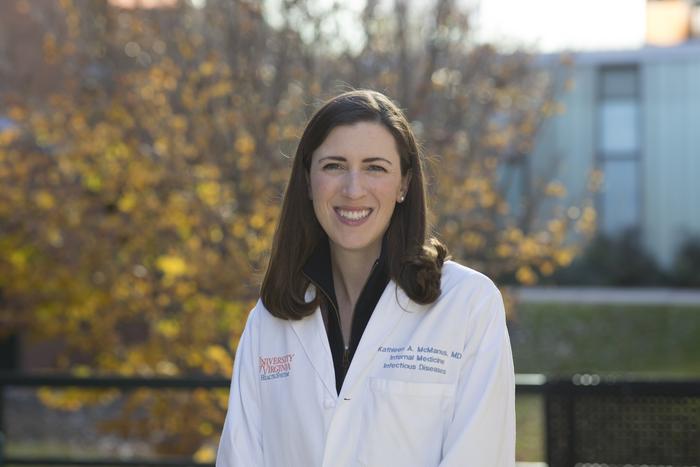A UVA Health doctor is launching an ambitious effort to assess and improve HIV care for people with low incomes across the nation, a campaign that could also help prevent transmission.

Credit: Dan Addison | UVA Communications
A UVA Health doctor is launching an ambitious effort to assess and improve HIV care for people with low incomes across the nation, a campaign that could also help prevent transmission.
Kathleen McManus, MD, MS, of the University of Virginia School of Medicine, and her collaborators plan to identify specific policies and programs that can increase the numbers of patients who keep the HIV virus in their blood at undetectable levels. This desirable state, known as being “undetectable” or having “sustained viral suppression,” is associated with better health outcomes for individuals and reduced risk of HIV transmission to other people.
As part of their effort, the researchers will examine state AIDS Drug Assistance Programs (ADAPs) to identify disparities in viral suppression between states and among different groups of patients. One goal is to understand how ADAPs help with health equity and ensure that different groups, including patients of different races or ethnicities, get high quality care and good health outcomes. This work will allow the researchers to determine which policies and programs are most effective, so that they can be implemented on a wider scale, helping improve care for more people with HIV in the United States.
“HIV medications are safe and highly effective, but unless we can get the medications into patients’ hands, they have no impact. HIV medications are incredibly expensive, and our health care system is difficult to navigate. We are studying the impact of a federally mandated and state-implemented public health safety net program that provides affordable, sustained access to HIV medications for people with HIV with low incomes. It is essential that no groups are left behind as the United States strives to improve the health of people with HIV and end the HIV epidemic,” said McManus, of UVA’s Division of Infectious Diseases and International Health. “While this program provides medications for about a quarter of people with HIV in the United States, it is understudied. By quantifying the impact of ADAPs, we can help policymakers and advocates understand its crucial role in United States’ HIV care. Additionally, by identifying specific best practices, we can help state health departments to improve their programs and federal policy makers to identify areas for technical assistance or support.”
Improving HIV Care
ADAPs are a vital safety net for people with HIV. Serving patients with lower incomes, ADAPs provide essential antiretroviral therapy (HIV medications) either for free or by subsidizing insurance plans. The programs are estimated to support more than a quarter of people with HIV in the United States.
The implementation of the programs varies by state, however, and McManus’ new project aims to shed light on best practices that improve outcomes and help the programs get the most for their money. She and her team were awarded a 4-year $2.9 million award from the National Institutes of Health’s National Institute of Allergy and Infectious Diseases, grant R01AI170093-01A1.
With McManus, the research team includes UVA Health’s Jessica Keim Malpass, Andrew Strumpf and Amber Steen; National Alliance of State & Territorial AIDS Directors staffers Tim Horn and Auntré Hamp; Emory’s Elizabeth Rogawski McQuade; and public health consultant Amy Killelea.
For their research, McManus and her collaborators have partnered with 10 state health departments, giving them anonymized information about 25% of ADAP clients. This is a first-of-its-kind multistate database, based on state health department partnerships, with information about approximately 60,000 people with HIV over 10 years.
The research team will partner with the state health departments to evaluate how the different ways programs are implemented affect viral suppression and other patient outcomes. The team also plans to interview AIDS/ADAP leaders in many states for additional insights that could lead to cost-effective strategies for equitable care delivery.
Informing Future Efforts
The researchers say their findings will allow ADAPs, state lawmakers and other key players, such as the leaders of the national Ending the HIV Epidemic initiative, to make wise choices about how to reach the best outcomes. It will also help facilitate the development of new initiatives to benefit people with HIV. (This type of ambitious work to improve care for Virginians and beyond is a key component of UVA Health’s recently unveiled, first-ever 10-year strategic plan.)
“Our goal is to quantify the impact of ADAPs on individuals, including people of different race and ethnicity groups, and the impact of ADAPs for HIV care in the United States. State ADAPs implement the program differently and also achieve different rates of good health outcomes. We will help to identify best practices so that state ADAPs can adapt policies and practices that are associated with success,” McManus said. “This project will transform data into action, and we are so fortunate to have built a strong, interdisciplinary team that will collaborate with state health departments to measure the impact of ADAPs and, ultimately, to help improve HIV care across the United States.”
McManus and her colleagues expect to work on this project for the next four years.
To keep up with the latest medical research news from UVA, subscribe to the Making of Medicine blog at http://makingofmedicine.virginia.edu.




